#Mimetic desire
Photo

Man is the creature who does not know what to desire, and he turns to others in order to make up his mind. We desire what others desire because we imitate their desires.
- René Girard (1923-2015)
Frnechman René Girard’s work has been enjoying a renaissance in recent years. He has long been recognised for his theory of human behaviour and human culture. In 2005 he was inducted into the Académie française, and in 2008 he received the Modern Language Association's award for Lifetime Scholarly Achievement. He was Professor Emeritus at Stanford University.
Back more than 50 years ago, René Girard started teaching French literature because he needed a job. He hadn't even read many of the books he was assigned to teach. Then, as he studied the classic novels of Stendhal and Proust with a fresh mind, staying one step ahead of his students, he was struck by a series of similarities from novel to novel. Unbound by any narrow research agenda, Girard discovered a simple but powerful pattern that had eluded sophisticated critics before him: imitation is the fundamental mechanism of human behaviour.
Stories thrive on conflict between characters. By reading the great writers against the grain of conventional wisdom, Girard realised that people don't fight over their differences. They fight because they are the same, and they want the same things. Not because they need the same things (food, sex, scarce material goods), but because they want what will earn others' envy. Humans, with a planning intelligence that sets them apart from all other animals, are free to choose. With freedom comes risk and uncertainty: humans don't know in advance what to choose, so they look to others for cues.
People can desire anything, as long as other people seem to desire it, too: that is the meaning of Girard's concept of "mimetic desire." Since people tend toward the same objects of desire, jealousy and rivalry are inevitable sources of social tension.
#girard#rené girard#quote#mimetic theory#sociology#philosophy#human condition#human nature#desire#wants#needs#imitation#copying#society#mimetic desire
79 notes
·
View notes
Text






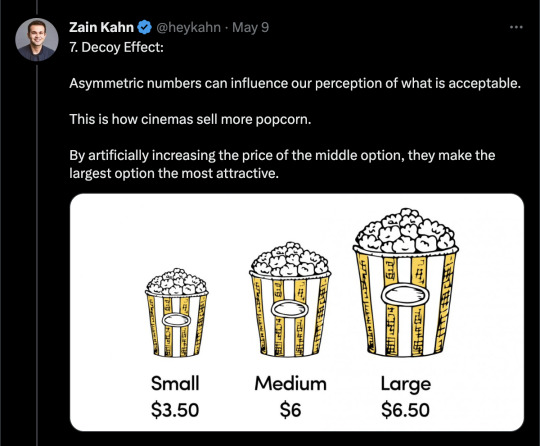
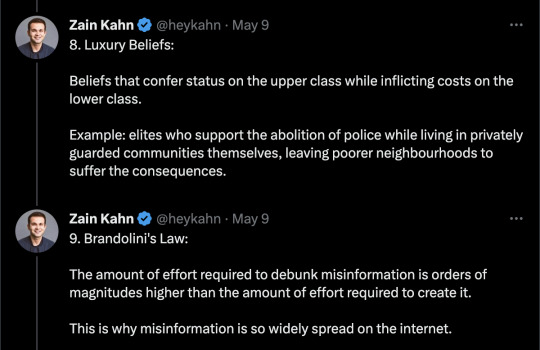
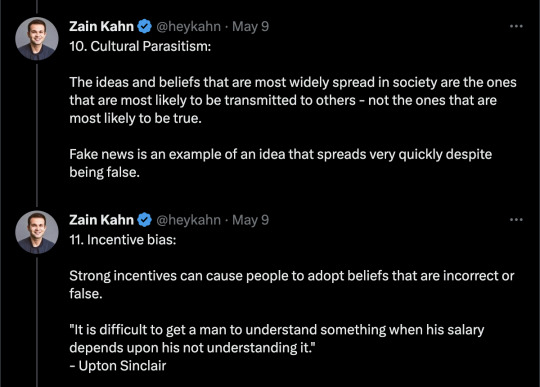


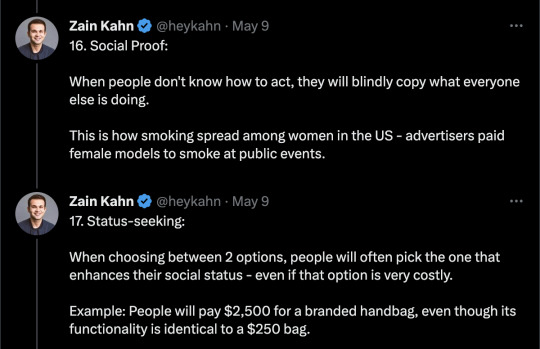

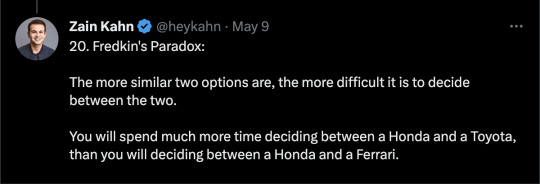
#Zain Kahn#Cunningham's Law#The Lindy Effect#Dunning Kruger Effect#confirmation bias#Hick's Law#The Streisand Effect#Decoy Effect#Luxury beliefs#Brandolini's Law#Cultural parasitism#Incentive bias#Reciprocity bias#Mimetic desire#risk aversion#uncertainty aversion#social proof#status seeking#evolutionary mismatch#Metcalfe's Law#Fredkin's Paradox#human psychology#psychology#cognitive biases#cognitive flaws#religion is a mental illness
126 notes
·
View notes
Text
Random musings on violence, theory, and hearing indigenous perspectives:
A few years ago (2018?), I picked up a book on Rene Girard's Mimetic Theory. I only made it a few chapters in because it was dry AF and I typically need some kind of research goal (like a fandom meta or upcoming podcast recording) to actually get through the more intense academic lit. But due to recent events, I decided to pick it back up. If you're not familiar with Rene Girard, he's a 20th-Century Christian philosopher who proposed a mimetic theory of violence, which is to say that he believed human violence to be universally driven by mimetic desire. Mimetic as in "mime" or imitation, so people instinctively desire to be like the other or have what they have, and so this unconscious envy often drives violence. Or at least, that was my understanding from what little I read.
Only a few pages in on my second attempt, and I could not help an overwhelming feeling of disgust. The book argues against common critiques of Girard's work, including that he has an ethnocentric (white eurocentric) view, and that his so-called "universal" theory disregards diverse perspectives. In my opinion, the defenses given were flimsy, even without having read the full critiques themselves, and to that I would add one more: Highly educated cishet white men have no place creating theories of violence when they are so rarely the object of such violence. Reducing the lived reality and trauma of predominantly women, queer, non-Christian, non-white people to an academic theory is patronizing at best and harmful at worst, because it reassures the theorist of their own righteousness without requiring them to actively DO anything to stop the violence or take responsibility for the ways people like them have victimized others throughout history. It's ivory tower bullsh*t at its absolute worst.
Now granted, I know Girard was a young man in occupied France during WWII, so I'm sure he had some firsthand experience with violence, but he spent the rest of his life in relative comfort, protected by his privileged status. And perhaps if his work had focused on more diverse sources, I might be less critical of that status, but as it is, there's a heavy emphasis on European literature. Not even historical accounts! But "great novels" of Europe's past. And these are worth studying, sure, but you can't reasonably call any theory formed from them "universal."
This is also a huge problem with the work of Carl Jung and Joseph Campbell. Which again, IS NOT TO SAY THEIR WORK HAS NO MERIT. I personally still find it illuminating and thought-provoking. But eventually, we have GOT to stop considering white men the standard for academic and philosophical thought! It's so limiting!
And historically, given how much violence has been perpetrated by white men upon others, I think it's worth considering that any theories of violence they propose may be incomplete or corrupt, and in any case useless to the victims. Lastly, I'm not particularly impressed by many of Girard's modern proponents, who skew more right-wing and therefore are often aligned with institutionalized violence.
So yeah, I quit the book. At this point, I'm much more interested in seeking out indigenous perspectives in academic discussions. My interest in folktales has led me to many fem scholars of color who collect such sources, so I'm gradually building a reading list that I think will ring true to me more so than authors like Girard. If any of my lovely followers have recommendations or thoughts on what I've shared, I'd appreciate your input!
#rene girard#carl jung#joseph campbell#mimetic theory#mimetic desire#indigenous#folktales#violence#academic writing#academic research
8 notes
·
View notes
Text
He wants to become the Other and still be himself. But why does he have this desire and why does he prefer this particular mediator when he could choose another? Why does he choose this model, idolized and spurned so hastily and so uncritically?
The wish to be absorbed into the substance of the Other implies an insuperable revulsion for one's own substance.
- René Girard, Deceit, Desire, and the Novel pg 54
can someone tell me wtf rene girard was on.... who was his object of idolatry... who did he wanna fuck and why did he publish a nonfiction book where half of it is him projecting onto the main character of notes from the underground..
5 notes
·
View notes
Text
Mimetic Desire: A Personal Exploration by R Lauren
Let me share a personal story that delves into the intriguing world of mimetic desire. Growing up, I always felt a strong urge to fit in and be accepted by my peers. Like many others, I found myself emulating the behaviors, preferences, and even fashion choices of those around me, often without giving it much thought.
One vivid memory stands out from my high school years. It was the era of boy bands, and everyone seemed to be obsessed with a particular group. Their music, style, and even hairstyles became the epitome of coolness among my friends. Despite my initial skepticism, I found myself gradually succumbing to the allure of their popularity.
As I observed my classmates eagerly discussing the latest songs and concerts, I couldn't help but feel left out. Mimetic desire kicked in, and before I knew it, I was downloading their songs, attempting to mimic their dance moves, and even sporting a hairstyle reminiscent of the band members.
Reflecting on this experience now, I realize how deeply ingrained mimetic desire is in our social fabric. It's not just about wanting to fit in; it's about seeking connection, validation, and a sense of belonging. In my quest to emulate the tastes and preferences of my peers, I unwittingly surrendered a part of my individuality.
Over time, however, I've come to appreciate the complexities of mimetic desire and its role in shaping our identities. While imitation can foster social cohesion and shared experiences, it's essential to strike a balance between conformity and self-expression.
Today, I strive to be more mindful of my motivations and choices, recognizing that authenticity is not about conforming to external standards but staying true to myself. My journey with mimetic desire has taught me the importance of embracing my uniqueness while also appreciating the diversity of perspectives and influences that shape our social landscape.
In sharing my story, I hope to spark a conversation about the power of imitation in our lives and encourage others to reflect on their own experiences with mimetic desire. After all, understanding why we copy others is not just about unraveling the mysteries of human behavior; it's about reclaiming agency over our identities and forging genuine connections based on mutual respect and acceptance.
2 notes
·
View notes
Text
Living the Mimetic Desires of Becoming a Civil Servant in India
Has it ever occurred to you what does it feel like—or even mean—to live freely? Despite all our personal privileges, are we truly free? Is anyone really free? These are the kinds of questions I thought through today as I traversed through the wide alleys of Central Delhi, getting drenched in the rain, escaping getting hit by ever-speeding cars, and slowing down to think if my friction-less…

View On WordPress
#civil servant#civil service aspirants#civil services#living through the mimetic desires of IAS#mimetic desire#mimetic desires#mimetic desires rene girard#state power and ias#UPSC#why people in india want to become IAS#why people want to do upsc
0 notes
Text
LINK FEST: 6 SEPTEMBER 2022
LINK FEST: 6 SEPTEMBER 2022
Links that may or may not be related to gardens, food, travel, nature, or heterotopias and liminal spaces but probably are. Sources in parentheses.
photos: Things Come Apart (Todd McLellan). Things coming apart.
essay: Mari Recommends: End of Summer Edition: Stuff I’ve loved this summer (Mari Andrew/Out of the Blue). I’m a sucker for this kind of essay, revolving around human mimetic desire. “A…

View On WordPress
#animated short#bicycling#colombia#cycling trip#dog#kayaking#linkfest#links#machines#macros#mari andrew#mechanisms#mementos#mimetic desire#mountain terrain#nature photos#objects#photos#summer#todd mclellan
0 notes
Text
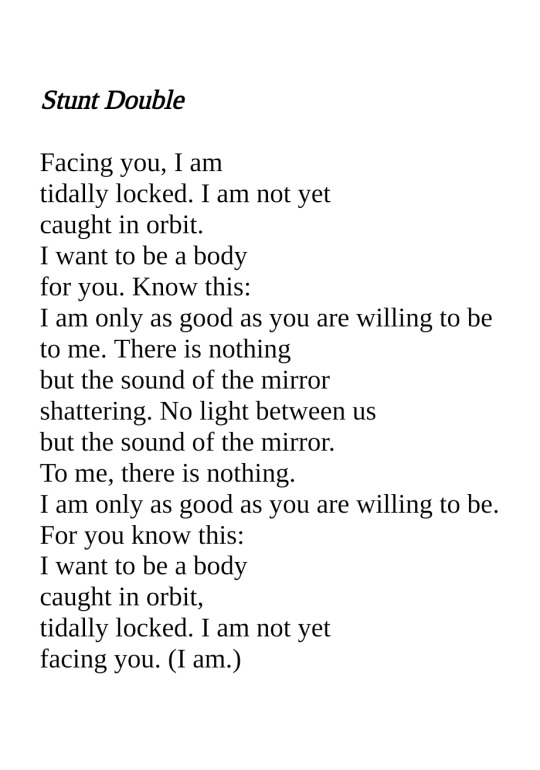
Stunt Double • July 2021.
Facing you, I am
tidally locked. I am not yet
caught in orbit.
I want to be a body
for you. Know this:
I am only as good as you are willing to be
to me. There is nothing
but the sound of the mirror
shattering. No light between us
but the sound of the mirror.
To me, there is nothing.
I am only as good as you are willing to be.
For you know this:
I want to be a body
caught in orbit,
tidally locked. I am not yet
facing you. (I am.)
#p#composition#archive#i started this in july of 2021 and i am SICK OF LOOKING AT IT so here it is beaten into something presentable#awful horrid evil terrible form never ever do this NOT WORTH IT#my girlfriend voice: it looks almost like a castle#me: SACRED KINGS HIDING IN /MY/ MIMETIC FORM? IT'S MORE LIKELY THAN YOU THINK#also everyone say thank you to my girlfriend for fixing One Word for me that made this Good#to start the orbit exchange all over again#the box of language desires form but not restraint
371 notes
·
View notes
Text

























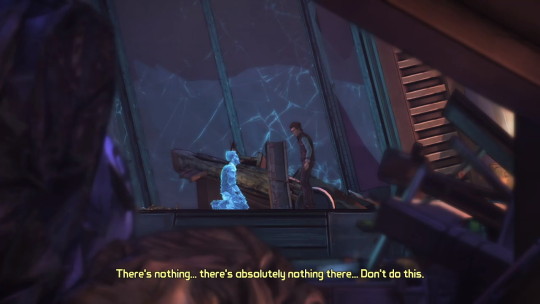

Borderlands: The Pre-Sequel // Tales From The Borderlands // The Double from "The book of imaginary beings" by Jorge Luis Borges // Violence and the Sacred, René Girard (6) (18) // Rick Barba, The Worlds of Borderlands // Mimetic theory from Wikipedia, the free encyclopedia // The scapegoat, René Girard // Zizek Ambercrombie & Fitch // Richard Siken, You Are Jeff // Brutus by Buttress (16) (27) // I See Satan Fall Like Lightning, René Girard // Kier-La Janisse, House of Psychotic Women: An Autobiographical Topography of Female Neurosis in Horror and Exploitation Films
#borderlands#handsome jack#timothy lawrence#rhys strongfork#parallels#moxxi is the object of desire in Tim and Jack's mimetic rivalry. to me.#I use “twin” and “brother” interchangeably with “doppelganger” btw#☀️
48 notes
·
View notes
Text
svsss (scum violence and the sacred saving system)
#i’m like. ten pages in but imagine the world’s heaviest and most girardian sigh.#chapter 6 from mimetic desire to the monstrous double. page 156 in my edition. hrgh#anyway. thought 1) oh rene girard we’re really in it now. thought 2) this is just like. the pharsalia. to ME#<- statements by the utterly deranged#svsssposting#beeps
16 notes
·
View notes
Text
body swap au where both characters like being the other so much but are still themselves so there's just two of the same person now
22 notes
·
View notes
Photo

The most powerful anti-Christian movement is the one that takes over and "radicalises" the concern for victims in order to paganise it. The powers and principalities want to be “revolutionary” now, and they reproach Christianity for not defending victims with enough ardor. In Christian history they see nothing but persecutions, acts of oppression, inquisitions.
This other totalitarianism presents itself as the liberator of humanity. In trying to usurp the place of Christ, the powers imitate him in the way a mimetic rival imitates his model in order to defeat him. They denounce the Christian concern for victims as hypocritical and a pale imitation of the authentic crusade against oppression and persecution for which they would carry the banner themselves. In the symbolic language of the New Testament, we would say that in our world Satan, trying to make a new start and gain new triumphs, borrows the language of victims.
- René Girard
René Girard was a brilliant thinker and pioneer of Mimetic Theory. Mimesis, mimetic desire, and metaphysical desire are the fundamental building blocks of Girard’s psychology. Even the most intimate aspects of our identity can be radically shaped by others and as such rarely can we distinguish vanity from authenticity. These psychological fundaments are what make humans social animals, why prestige and recognition matter so much to us, and how we are able to form cultures and even language itself. They are responsible for humanity’s greatest achievements, but they also render us helplessly fallen creatures in creation.
Although he died in 2015 he had already diagnosed the driving force behind many headed hydra of intersectional feminism, anti-racism, and the woke that was already growing influential in far leftist circles in academia and beyond. He believed such forces used victimism as the ideology of concern for victims to gain political or economic or spiritual power.
#girard#rené girard#quote#mimetic theory#pyschology#sociiology#history#society#mimetic desire#metaphysical desire#intersectional feminism#anti-racism#woke#victimhood#victimism#ideology#progress as regression#human condition
70 notes
·
View notes
Text


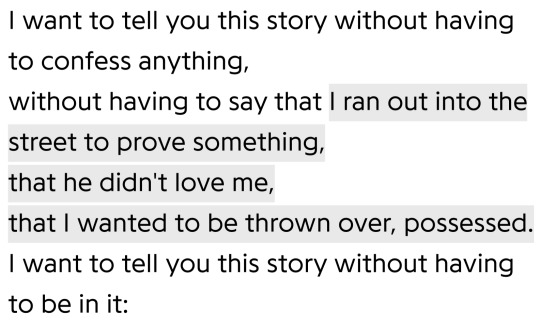





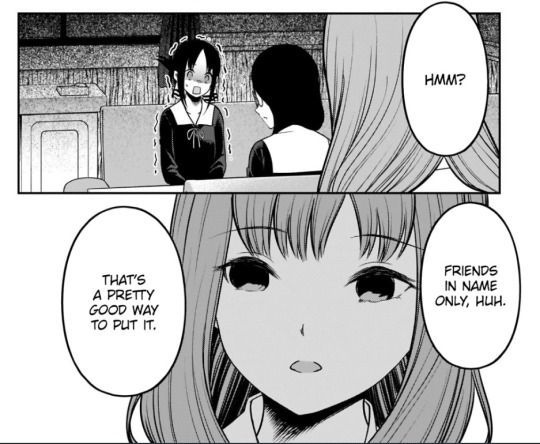
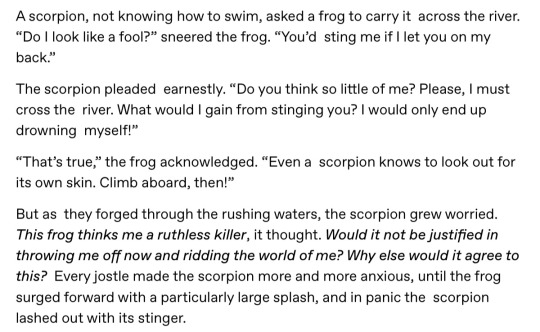




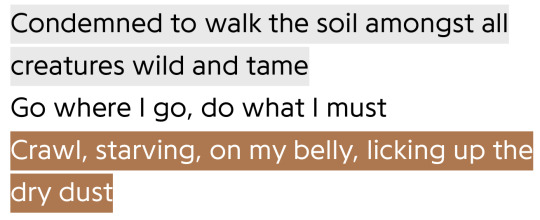





Andrew Davies, Othello (2001) // Antoine de Saint-Exupery, Manon, Ballerina // Richard Siken, The Torn-Up Road // Sue Zhao, I Still Loved You // Nerdy Girl, Hate Me // sadoeuphemist, The Scorpion and the Frog // Madeline Miller, Song of Achilles // The Mountain Goats, How to Love a Swamp Creature // New Order, Bizarre Love Triangle // Jane Heller Levi, Waiting for this Story to End Before I Begin Another // Lavalove, Luck in Love // Sea Ghosts, Cowboy Hat // Aka Akasaka, Kaguya-sama Love is War Ch 231
#kaguya sama spoilers#iino & osaragi#kaguya sama manga#iino x osaragi#the more i make these the more unhinged the tags get lol#on my earlier reads i thought osaragi's rant was kinda like when shinomiya insults shirogane in order to persuade fujiwara away from him#but now i also think it's similar to when iino tells shirogane all the reasons she shouldn't like ishigami only to cry at the end#what do jolene the stone bowl arc and nerdy girl's hate me have in common#they were all supposed to be straight but it doesn't take much to think that they're very much not#seriously the lyrics of hate me are literally about the singer taking the boy that her friend loves#but she spends most of the song screeching to her friend as if burning bridges and knowing her friend hates her for sure is the actual poin#it's the same idea from torn-up road where they do something self-destructive to know for certain that it will be unrequited#hate me is a banger go listen to it! but anyway#the scorpion story fits not only bc of the 'nature' part but bc sadoeuphemist writes it as a loop#the story usually plays out badly but the loop continues anyway which works for knowing the bad ending but being unable to give up#against her better judgement#coincidentally othello is iino's character song although it's about the board game not the shakespeare play#but there's an essay on othello that talks about mimetic desire and that sums up what i was thinking in an older post really well#also fyi torn-up road and othello are a male narrator talking about a man just to clear that up#web weaving
18 notes
·
View notes
Text
Everything is so embarrassing all the time I literally just imprinted on Mädchen in Uniform (1931) and The Dybbuk by S. An-sky so formatively that my (psycho)sexual preferences/proclivities might as well be intertextual allusions. This book is narrating my id back to me
#malkele hirsch school of disembodied poetics#everything is mimetic desire but especially aspiration
9 notes
·
View notes
Text
rotating this in my brain

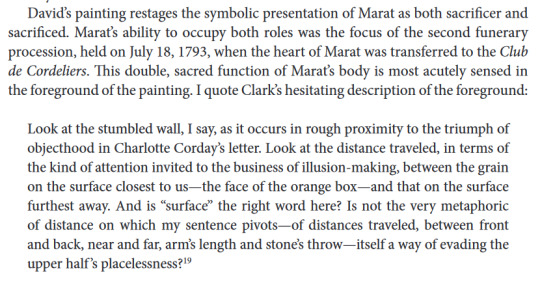
#personal#my head hurts so bad and I should probably not be staring at a screen.#uhh. Marat as triangular desire mediator between the people and the king resulting in a deadly mimetic dynamic#sacrificer and sacrificed. etc.#i think you all would enjoy mimetic theory. actually.#also the... consistent characterisation of Marat as eidolon or some kind of dead-alive double or contant presence duplicated in society#is. a lot. to me.#not just the Victor Hugo quote but I read an article where the author described Marat as dying again every time a funeral was held#putting him in the position of someone who wasn't dead but dying. dying and then being resurrected and dying again.
5 notes
·
View notes
Note
wait when were the bros jealous of eo did i miss something ? probably.
I think anon might've interpreted joaquin's disapproval of sergio + diego as jealousy rather than just not wanting his friends hooking up to avoid a mess where he'd have to pick sides (though ofc you're free to interpret it as you like 🤲)
6 notes
·
View notes